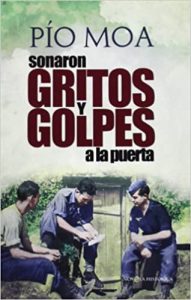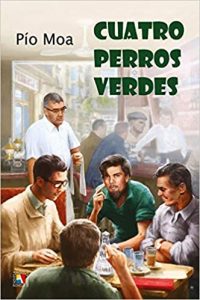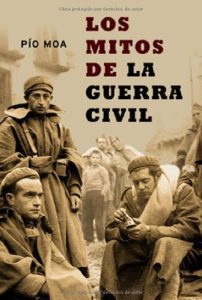The saying goes something like this: "It is normal to be a communist while you are young to have a heart and a conservative in adulthood to have a brain." This idea, in the case Tweet moa, points to a greater significance. Because this author of historical books, essays and the odd novel rotated 180º corresponding to the most complete ideological mutation.
The fact that la History always has someone who sees its objectivity To show it off in one way or another is undeniable in light of the alleged documentation of one or the other. Investigations that end up facing them precisely for generating thesis and antithesis (Pío Moa's conflict with the Hispanicist Paul preston, among others, is noteworthy).
The point is that Pío Moa transmits his subjective notion about facts always open to interpretation, insofar as History is narrated from the human will and its consideration is always intended to mark the facts towards one side or the other. With some and with others, who loses in the end is the truth. But it's what we have left, like knowing, pulling the greatest hyperbole, how the hell the world was made. The truth does not belong to us, everything else is burning nails where we come out full of blisters.
Top 3 recommended books by Pío Moa
Screams and knocks sounded at the door
Surprising yes, a novel in the first place. But it is that in the end the literature heals when it is approached without the thorns of the positions and the trenches. A singular guy like Pío Moa wrote this peculiar novel that deserves to be rescued.
That in the end we end up reaching the historical and a possible biased framework, as well. But at least we already start from a fictionalized intention, from that fiction from which perhaps some kind of agreement can be reached on some occasion.
Barcelona, 1936. In the convulsions of the time, the protagonist of this novel witnesses the atrocious death of his father, and his destiny will be marked. He will live intensely the experience of three wars, love, the "splendor and horror" of the time, until he discovers the truth hidden in the eyes of his father's murderer, which reveal the truth about himself: "A kind of revelation it pushed through from deep within me with a force that I could only describe as holy terror. My teeth chattered and my heart raced. I slowly collapsed on my knees ?? ».
The characters act and collide with each other dragged by the turbulence of some iron years, hard and exciting. Much of the events that serve as a framework for the action were real. Thus, a murder almost identical to the initial event, the Catalan conspiracy to end the president of the Generalitat, Lluis Companys, the hell of Posad, the intrigues of spies at the Embassy in Madrid, the Gijón coffee gatherings, the plan to fly power plants in Galicia or a similar ambush, planned by the information service of the Falange, to various parties of the maquis.
Four green dogs
We continue in the realm of fiction. We go from Barcelona to Madrid, from the beginning of the Civil War to the leaden years of the dictatorship. Once again, youth is the best focus to passionately see turbulent times that point to changes from the sociological to the most intimate sphere of each character.
Madrid, one day in November 1967. Having breakfast in a neighborhood hubbub, four students engage in a serious and sarcastic discussion about the meaning of life. The waiter, Mocking, calls them "green dogs." The discussion will mark the journey of the four in various ways, which for one will bring their first love experience; for another the disturbing memory of a dirty unsolved crime that he attributes to an old friend; for the third the obsession for a love concluded years before with the death of his beloved; and for the fourth a complicated adventure related to terrorism.
In between, an incident in the university canteens tenuously links with an episode from another novel by the author, shouting and knocking on the door. The story takes place between the student political restlessness of the time and the vital chaos of the city, under a sun that acquires a strange protagonist feature.
The myths of the Civil War
We are already in flour regarding the argumentation of the controversial author. In this book, Pío Moa gives himself to "his" noble cause to elucidate facts in order to present them with that patina of rigor. Although finally the composition can be lifted if you scratch a little to discover that it is always the same on either side of the expired facts: interpretation. The exhaustiveness is to be praised but it never gives the complete reason.
This book addresses one after another the myths of the Civil War, bringing us closer to their historical reality through a logical examination of the data and a rigorous critique.
The war in Spain, in the words of the British historian Paul Johnson, "was the XNUMXth century event about which the most lies have been written." The still persistent dense feelings surrounding that key event in our past often cast a veil over the facts, preventing us from seeing and assessing them clearly.
This book tackles these myths one after another, bringing us closer to their historical reality through a logical examination of the data and a rigorous critique of versions that are often highly popularized, but of doubtful veracity. In passing, it clarifies the role of political leaders, from Azaña to Franco, on the path that led Spain to the catastrophe.



